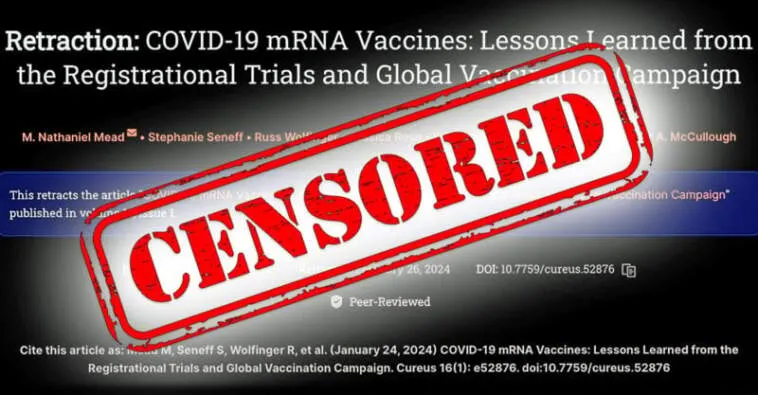(The Defender) The journal Cureus on Monday retracted the first peer-reviewed paper to provide an extensive analysis of COVID-19 mRNA vaccine trial data and post-injection injuries. The authors of the paper also called for a global moratorium on the vaccines.
Dr. Peter McCullough, one of the paper’s authors, called the retraction “a stunning act of scientific censorship.” He told The Defender:
“The journal and its editors had the right to reject the paper at any time during the review process. Once published, it is a violation of the Committee on Publication Ethics (COPE) Guidelines to retract a paper without adequate justification.”
The paper, published last month, detailed the vaccines’ potential serious harms to humans, vaccine control and processing issues, the mechanisms behind adverse events, the immunological reasons for vaccine inefficacy and the mortality data from the registrational trials.
The authors concluded:
“Federal agency approval of the COVID-19 mRNA injectable products on a blanket-coverage population-wide basis had no support from an honest assessment of all relevant registrational data and commensurate consideration of risks versus benefits.”
They also called for the vaccines to be immediately removed from the Centers for Disease Control and Prevention’s (CDC) childhood immunization schedule and for the boosters to be suspended.
The paper was read more than 350,000 times in the month after it was posted. An average Cureus paper has only approximately 2,700 views in an entire year.
McCullough said research integrity staffer Tim Kersjes at Springer Nature, which publishes Cureus, last week informed the authors that the journal was retracting the paper. Kersjes raised eight points of concern, which McCullough said the authors had previously addressed in an exhaustive peer-review process.
McCullough told The Defender:
“I am suspicious that Kersjes and Springer Nature were pressured by the powerful Bio-Pharmaceutical Complex of coordinated public health organizations, vaccine manufacturers, and regulatory agencies to censor our paper to keep critical vaccine safety information from getting to the medical community.
“We rejected the retraction, fully appealed and will report this unethical action to all relevant authorities as we move on to publish elsewhere.”
M. Nathaniel Mead, the paper’s lead author, told The Defender he had been concerned from day one that the journal would be pressured to retract the article.
“I knew as soon as I hit the Cureus ‘publish’ button on January 24, following the extensive review process and multiple re-submissions, that we were dealing with a ticking time bomb,” Mead said.
“By citing solid evidence and exposing how the industry-sponsored trials misled the public, our evidence-informed paper was an all-out indictment of the COVID-19 vaccine enterprise.”
‘Predatory retractions’ benefit Big Pharma
Dr. John Adler at Stanford University and Dr. Alexander Muacevic at the University of Munich founded Cureus in 2009 as a web-based peer-reviewed open-access general medical journal with low cost barriers to publication.
The academic publishing giant Springer Nature bought Cureus in December 2022.
Springer Nature is a publishing conglomerate founded in 2015 through a merger of Nature Publishing Group, Palgrave Macmillian, Macmillan Education and Springer Science+Business Media.
The publisher generated 1.8 billion euros in 2022, showing continuous year-over-year growth since 2020.
Springer Nature has an in-house Research Integrity Group dedicated to ensuring the company’s scientific content is “rigorously assessed.” When issues arise that require the input of “research integrity experts,” the Resolutions Team, headed by Kersjes, steps in.
Kersjes notified the authors on Feb. 16 that the journal editors planned to retract the article, noting the journal “was recently made aware of several concerns regarding the validity of the work.”
According to the email text, posted on Substack by Steve Kirsch, another of the paper’s co-authors, those concerns “in our view can’t be remedied with a correction.”
Kersjes told the authors they had the option to agree or disagree with the retraction, which would be noted on the website.
They disagreed. “We vigorously reject this opinionated, ex post facto, arbitrary, and capricious decision on the part of Kersjes and his Springer superiors,” they wrote.
The letter from Kersjes specified concerns with claims the authors made about all-cause mortality data, Vaccine Adverse Event Reporting System (VAERS) data, the number of deaths from vaccination versus lives saved, possible vaccine contamination, their assertion that the vaccines did not undergo proper safety and efficacy testing, the “incorrect” statement that spike proteins linger in the body and can cause adverse effects and that the vaccines are gene therapy products.
In their rebuttal, the authors responded to each criticism, explaining their argument and providing supporting citations. They noted the article’s eight reviewers and journal editors had found their responses satisfactory.
A few days after the initial publication, Adler, who is Cureus editor-in-chief, told the industry-friendly website Retraction Watch, “Our editorial response was extra vigilance during the peer review process with 8 different reviewers weighing in on publication or not, including a few with strong statistics knowledge. Therefore, a credible peer review process was followed and the chips fell where they may.”
Adler also said the journal would reevaluate if “fatal flaws” were identified. “The decision process Cureus made contrasts sharply with Elsevier’s seeming editorial decision to just censor the article using ad hominem concerns.”
However, a spokesperson for Cereus told The Defender today, “Following publication, concerns were raised regarding a number of claims made in the article and an investigation by Cureus and Springer Nature’s Research Integrity team identified several issues with the article which warranted a retraction.”
The spokesperson added, “It is preferable that such issues are caught during peer review but unfortunately that is not always the case. What is therefore important, is that, as happened in this case, when issues are raised post-publication, they are dealt with swiftly so that the integrity of the academic record is preserved.”






